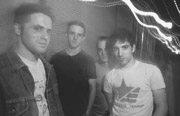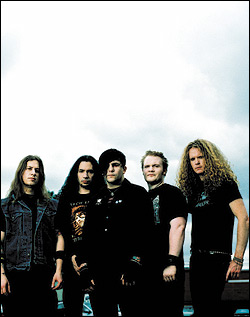WHEN I WAS 16, I spent a lot of time contemplating which of my female classmates would fare best in a Penthouse layout. When they were 16, the members of Cave In spent a lot of time pushing previously definable terms like “hardcore” and “metal” to a spasmodic frontier that older contemporaries had only scratched at—nearly achieving sonic dystopia.
Cave In
Paradox Theater, Thursday, January 11
Boys will be boys, right? Despite setting up shop at opposite ends of the aesthetic spectrum, Cave In have as much to explain about their past as I do. The Boston quartet, who superbly described their initial m.o. in one of their own song titles (“Controlled Mayhem Then Erupts”), recently abandoned all vestiges of cluster-fuck savagery for something 100 percent more satisfying and just as visceral.
Their most recent release, Jupiter (on Hydra Head Records), is a masterful amalgam of ’70s space rock and thudding modern metal. It’s the real-deal aggregate of all overused critical clich鳭-ambitious, challenging, thought-provoking, incendiary—and is all the more confounding because it came from four young musicians predisposed to uninhibited aggression, rather than from, say, Radiohead.
Many newcomers are eagerly following Cave In’s radical, ongoing makeover, even if some longtime denizens of the hardcore community aren’t.
“There’s a couple of kids at each show who just yell for ‘Crossbearer,'” bassist Caleb Scofield says in a telephone interview, referring to one of the band’s old-school spazzfests. “Not to sound like a dick, but I’d rather disappoint them than not play the music I want to hear. For every two people that hate us now, there are three others who are really into it.”
What Cave In have done on Jupiter would resemble a sellout only to the hardest-hearted of elitists. Their bombast is certainly more refined, a complex web of dog whistle guitar shrieks and pummeling rhythm that never degenerates into technical wankery. Most obvious is the change in vocalist/guitarist Stephen Brodsky, whose range seems to have metamorphosed from Pantera to Prince.
“Yeah, Steve’s a show-off,” Scofield says with a laugh. “He’s always been able to sing that way. It got to a point after our last album where he said, ‘If I keep screaming my head off, I’ll lose my voice permanently.'”
Scofield is the group elder, an ancient 22 (Brodsky, guitarist Adam McGrath, and drummer J.R. Conners are all 21). Like most indie bands, when Cave In aren’t touring, the musicians toil through day jobs.
“Steve has a temp job, but sometimes he plays in the (Boston) subways,” Scofield says. “He makes a lot more money down there than at his regular job. The only problem is if he does it on nights where we have shows, sometimes he burns his voice out and we’re screwed.”
CAVE IN’S PROPENSITY for epic performances may be preternatural. Most of Jupiter‘s eight tracks stretch well past the four-minute mark. Maturity and eloquence abound in the protracted climax of “Innuendo and Out the Other” (pre-chorus: “There’s something wrong when all the efforts you have made are lying in your room”) and the nine-minute monster “Requiem.”
“‘Innuendo’ originally had this explosive ending where I took over vocals and screamed my guts out,” Scofield says. “But overall, the process wasn’t too deliberate. We weren’t intending to write long songs. ‘Requiem’ took so long to write we just got burnt out recording it. We never play it live.”
The young band already have an encyclopedia of side projects, from Brodsky’s poppier solo work to the just-released Sacrifice Poles instrumental album, an eclectic, warped detour through Jupiter‘s looking glass.
“When we were writing Jupiter, we had a few days of writer’s block where we’d leave the studio with nothing,” Scofield recalls. “So we just did jams and improv for a while. At the end of one day we had four songs, then Adam and Steve threw on some of their own stuff and it became Sacrifice Poles.”
Some listeners are tracing Cave In’s new sound back to the days of progressive rock, even the otherworldly twilight zone of Rush—a comparison that befuddles Scofield.
“I mean, we like them, but not obsessively,” he says. “We’ve been listening to a lot of Yes in the van recently. It’s funny because that shit is so ridiculous and overblown. I mean, I couldn’t picture writing songs like that.”
Although he lists collective influences such as Queens of the Stone Age, Radiohead, and Iceburn, close observation of Cave In’s previous albums reveals an affinity for underrated, defunct LA quartet Failure. Cave In cover their “Magnified” on Creative Eclipses, and while “Segue 1” and “Segue 3” on Until Your Heart Stops aren’t to-the-letter covers, the homage to Failure’s Fantastic Planet is obvious.
“You’ll hear 5,000 blatant Failure rip-offs in our stuff,” Scofield half jokes. “If we steal shit from a band no one in our genre has heard of, all the better.”







